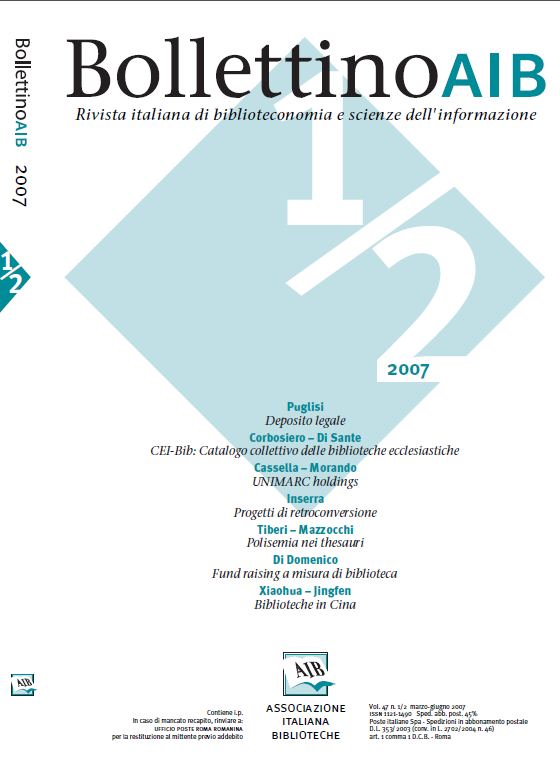Management of polysemy in thesaureses: the case of philosophical terms
Main Article Content
Abstract
Polysemy is the phenomenon whereby it is possible to associate a number of meanings to the same lexical entry. It exists in every known language and it contributes to determining their plasticity and versatility, characteristics which guarantee a language, as a semiotic system, those capacities to adapt that give it its vitality.
In some practical requirements, however, polysemy becomes a factor that can hinder communication. Therefore a need to control it arises, while not however disclaiming its func-tion, in order to facilitate optimal information management.
It is well known that in controlled indexing vocabularies, semantic control has as its objective the transformation of each lexical entry into a single meaning entry. As we will see, the application of this principal has some complications if applied to the terminology of the area of philosophy.
In fact, philosophical terms have considerable layers of meanings, due to the fact that they maintain a certain strong relationship with the past.
The creation of a philosophy thesaurus, something that would be very desirable even if full of difficulties, should therefore be considered in the light of the problems that will be introduced here.
This article analyzed one of the characteristics for the area of philosophy, the recur-rence of the phenomenon of polysemy in its terminology, while trying to at least draft some operational solutions.
With regard to the treatment of semantic ambiguity and therefore of polysemy in the-sauruses, one of the main problems to be solved is how to reconcile the achievement of under-standing the meanings with the practicability of the method of eliminating ambiguity when op-erational.
Another aspect that has to be investigated , both at theoretic and application level, is the distinction between homonym and polysemy, not allowed today by available methods, but which seems to be of importance in information recovery.
In this context, the increase of the universality of a vocabulary thus becomes a desirable char-acteristic, implementing a criteria that was already previously expressed by some authors on the basis of which the level of usability of a vocabulary is proportional to its universality.
In some practical requirements, however, polysemy becomes a factor that can hinder communication. Therefore a need to control it arises, while not however disclaiming its func-tion, in order to facilitate optimal information management.
It is well known that in controlled indexing vocabularies, semantic control has as its objective the transformation of each lexical entry into a single meaning entry. As we will see, the application of this principal has some complications if applied to the terminology of the area of philosophy.
In fact, philosophical terms have considerable layers of meanings, due to the fact that they maintain a certain strong relationship with the past.
The creation of a philosophy thesaurus, something that would be very desirable even if full of difficulties, should therefore be considered in the light of the problems that will be introduced here.
This article analyzed one of the characteristics for the area of philosophy, the recur-rence of the phenomenon of polysemy in its terminology, while trying to at least draft some operational solutions.
With regard to the treatment of semantic ambiguity and therefore of polysemy in the-sauruses, one of the main problems to be solved is how to reconcile the achievement of under-standing the meanings with the practicability of the method of eliminating ambiguity when op-erational.
Another aspect that has to be investigated , both at theoretic and application level, is the distinction between homonym and polysemy, not allowed today by available methods, but which seems to be of importance in information recovery.
In this context, the increase of the universality of a vocabulary thus becomes a desirable char-acteristic, implementing a criteria that was already previously expressed by some authors on the basis of which the level of usability of a vocabulary is proportional to its universality.
Article Details
Section
Articles

This work is licensed under a Creative Commons Attribution-ShareAlike 4.0 International License.
